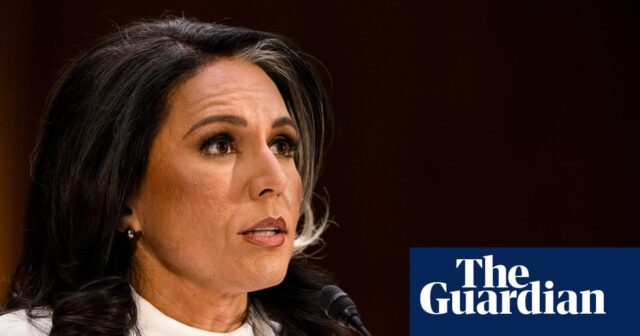A smooth path to the pinnacle of America’s intelligence pyramid was never in the cards for Tulsi Gabbard.
Dogged by a catalogue of eyebrow-raising past statements about Russia, Ukraine and Bashar al-Assad, accusations of parroting Kremlin talking points, and a lack of experience in intelligence (not even having sat on a relevant congressional committee), Gabbard was always a counterintuitive choice to sit atop the 18 US spy agencies and their roughly 70,000 employees.
On cue, her nomination by Donald Trump to be director of national intelligence is mired in trouble and facing the possibility of failure, as Republicans and Democrats on the Senate intelligence committee coalesce to question her credentials.
But it is not her views on Russia’s invasion of Ukraine or her previous skepticism about Assad’s use of chemical weapons that are making her the most jeopardised of Trump’s gallery of questionably qualified nominees.
Nor is it her potential role as an instrument of the restored president’s well-trailed thirst for a purge of an intelligence community he regards as a hostile “deep state”, made plain in an executive order that has been branded a “roadmap for retribution”.
Instead, it is Gabbard’s past support for the now exiled former National Security Agency whistleblower, Edward Snowden, and her refusal to label him a “traitor” that is threatening to become the rock on which her nomination founders.
In a striking series of exchanges during her confirmation hearing on Thursday, Gabbard declined to denounce Snowden in unequivocal terms, despite repeated chivvying from Republican and Democratic senators, and to the obvious chagrin of both sides.
An exchange with Michael Bennet, a Democratic senator from Colorado, was particularly rancorous. But it was hostility from Republicans – only three of whom Gabbard can afford to lose in a final confirmation vote – that has dimmed her prospects.
“I think it would befit you and be helpful to the way you are perceived by members of the intelligence community, if you would at least acknowledge that the greatest whistleblower in American history, so called, harmed national security by breaking the laws of the land around our intel authority,” Todd Young, a Republican senator for Indiana, told her, as irritation rose with Gabbard’s steadfast refusal to go further than saying Snowden “broke the law” and that she was focused on preventing a repeat.
The hostility from both sides partly reflected the nature of the committee itself, which is unusually bipartisan in an acutely polarised era partly because members from both parties tend to be foreign policy hawks.
But focusing on Snowden – who in 2013 leaked to journalists, including from the Guardian, a trove of highly classified documents accessed while working as a contractor at the NSA – may also have been a convenient escape hatch for Republicans wary of excessively concentrating on Russia because of Trump’s own skepticism towards Ukraine’s cause and his record of affinity for Vladimir Putin.
Further fueling the antagonism is that Snowden’s disclosures exposed the committee’s complicity in a surveillance program that critics believed it had a duty to stop.
“Snowden embarrassed this committee by doing its job,” said Ben Wizner, Snowden’s lawyer and head of the American Civil Liberties Union’s speech, privacy and technology project.
“The committee approved in secret surveillance programs and activities that could not survive public scrutiny. All three branches of government changed course following the disclosures. Had the committee done its job, Snowden’s whistleblowing would not have been necessary.”
Among other things, Snowden’s disclosure exposed the NSA’s Prism program, which allowed the agency to access emails, documents, photos and data held by technology companies including Facebook, Google and Microsoft under secret agreements enforced by the congressionally authorised threat of court action against those that refused to share information.
He also revealed the bulk system XKeyscore, described as NSA’s Google, which enabled American intelligence agents to access and analyse global internet data.
Among the resulting backlash from the revelations were the end of the agency’s collection of millions of Americans’ phone records in bulk, and an increased public focus on digital privacy.
The committee’s interrogation of Gabbard conveniently overlooked that Snowden exposed wrongdoing and that popular outrage over the massive surveillance program was intense and widespread – straddling the Republican-Democratic divide in a way that mirrors the demand by the bipartisan national security establishment for Snowden to be branded a traitor.
Moreover, Gabbard’s previous support for a pardon for Snowden – who faces three charges under the Espionage Act and a 30-year jail sentence if he ever returns to the US from his Russian exile – has been shared by those at both ends of the political spectrum, including by Bernie Sanders, who has called for his clemency, and hard-right Republicans such as Matt Gaetz and Thomas Massie.
None of that seems likely to help her now, even as she renounced her former opposition to section 702 of the Foreign Intelligence Surveillance Act (Fisa), which the intelligence community has deemed essential for gathering intelligence on non-US citizens, under intense pressure from Republican senators.
Josh Hawley, the hard-right GOP senator for Missouri and one of Gabbard’s supporters, appeared to hold out little hope for her nomination in an appearance on Fox News.
“Her real sin, in the eyes of so many of the Washington establishment of both parties, is she challenged the surveillance state,” he said. “She told the truth about the government spying on Americans … [and] she is getting absolutely roasted and persecuted.”






